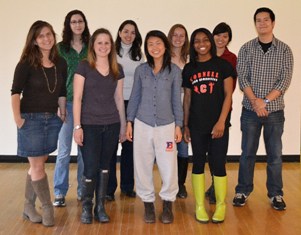By: Aileen Costigan

A known side-effect of healthy aging is having trouble finding the right word to say. But some older adults experience more rapid decline or other language difficulties not typically found in healthy aging.
A pilot study led by Barbara Lust, professor of human development and director of the Cornell Language Acquisition Laboratory, with collaborators Dr. Janet Cohen Sherman at Massachusetts General Hospital, and Professor Suzanne Flynn at the Massachusetts Institute of Technology, suggests that older adults with early Alzheimer’s disease may be especially prone to difficulty constructing complex sentences as well as finding words. Such language problems make daily communication difficult and may also be an early marker for Alzheimer’s disease or other cognitive impairments.
“There is a distinct gap in the research on language decline in those with clinical conditions,” said Lust. “Several studies have raised the possibility that very early Alzheimer’s disease may be associated with deterioration in written language as seen in the works of popular authors such as Iris Murdoch. One unique contribution of our project is that we are looking at what is happening in spoken language. Another is that we are looking at sentence formation.”
Lust and the other researchers in the Cornell Language Acquisition Lab (CLAL) and the Virtual Center for Language Acquisition (VCLA) are comparing language and cognitive abilities in three groups: healthy aging adults, adults with signs of mild cognitive impairment, and young college-aged controls. Participants are asked to repeat a series of sentences and are tested on the accuracy of their repetition. So far they have tested 40 participants and they plan to test more.
Preliminary results show that the declines found in language abilities may be separate from declines in overall cognition (e.g., memory). Specifically, those with mild cognitive impairment show particular challenges with vocabulary (e.g., word finding difficulties, word substitutions) and in certain types of complex sentence formation.
Results from this research, may shed light on the mechanisms of language decline and lead to techniques for early diagnosis and interventions for both healthy and cognitively impaired older adults.
“We are also planning to compare our findings in older adults to language development in young children,” said Aileen Costigan, project manager of the Alzheimer’s project. “If the results are the same in the young and older populations, this could help us determine how language decline is likely to occur with older adults and people with Alzheimer’s disease. We may then know more about what to expect as the disease progresses.”
The Cornell Language Acquisition Lab, led by Lust and her collaborators, Dr. Cohen Sherman, Professor Flynn, and undergraduate Jordan Whitlock, is a collaborative, interdisciplinary group of researchers, educators, and students. Together with faculty, a talented group of undergraduate students from across the University is actively engaged in gathering and analyzing the pilot data and presenting the results in regional and national conferences.
“The Alzheimer’s language project has given me the opportunity to become deeply involved in the research process beyond what I expected as an undergraduate student. I expect to use the skills I’ve developed in data analysis, management, and interdisciplinary collaboration as I enter graduate school next year,” said Jordan Whitlock, a senior majoring in Linguistics and Cognitive Studies in the College of Arts & Sciences and planning to enter the Speech and Hearing Bioscience and Technology program at Harvard-MIT’s Division of Health Sciences & Technology.
This research is supported in part by the Cornell Bronfenbrenner Center for Life Course Development, Cornell Institute for Translational Research on Aging [CITRA] Pilot Study Program, Cornell University Cognitive Science program, Cornell University Institute for Social Sciences, and Hatch Grant/Federal Formula Funds.
Aileen Costigan, Ph.D., is the project manager of the Alzheimer’s language project and researcher in the Cornell Language Acquisition Laboratory.

